
Fahnen, Flaggen und Kalender bei Fanshop-Online.de bestellen
This page is part of © FOTW Flags Of The World website.FOTW beschäftigt sich mit der Wissenschaft der Vexillologie (Flaggenkunde).
Alle auf dieser Website dargebotenen Abbildungen dienen ausschließlich der Informationsvermittlung im Sinne der Flaggenkunde.
Wir distanziert uns ausdrücklich von allen hierauf dargestellten Symbolen verfassungsfeindlicher Organisationen.
Dictionary of Vexillology: Appendix VI
Stripes in Heraldry
Last modified: 2019-04-26 by rob raeside
Keywords: vexillological terms |
Links: FOTW homepage |
search |
disclaimer and copyright |
write us |
mirrors
The Dictionary of Vexillogy:
The following terms may be encountered in a heraldic context with regard to stripes.
Diagonal Stripes
The following terms may be encountered when referring
to a diagonal stripe in flags, or banners of arms, or heraldic flags of some other
description.
- Bend
- A straight broad band extending from the upper hoist corner to the lower fly
corner centred on the diagonal meridian – a diagonal stripe, a descending or falling diagonal.
However, heraldic use frequently suggests that the bend should occupy about one-third
of the field when charged, and one-fifth when plain – but see ‘descending
diagonal’ and ‘per bend’ in the main text.
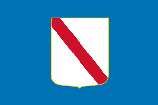

Flag of Campania, Italy (fotw); Flag of Strasbourg, France (fotw)
- Bend Sinister (plural Bends Sinister)
- A straight broad, band extending from the lower hoist corner to the upper
fly corner centred on the diagonal meridian – a diagonal stripe, an ascending or rising diagonal.
However, heraldic use frequently suggests that a bend should occupy about one-third
of the field when charged, and one-fifth when plain - but see
‘ascending diagonal’ and
‘per band sinister’ in the main text (also
‘sinister’).

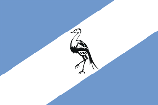
Shield of Oostdongeradeel, Holland (CS); Flag of Ciskei, South Africa 1977 – 94 (fotw)
- Bendlet and Bendlet Sinister
- A diminutive of bend and bend sinister, nominally half the width of a bend
but often much narrower and usually appearing in numbers of two or more.
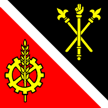
Flag of Courchapoix, Switzerland (fotw)
- Bendy
- The division of a shield, banner of arms, flag or any division thereof
into four or more (usually equal) bends or bendlets in alternating tinctures.
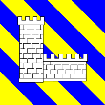
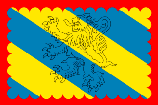
Flag of Molondin, Switzerland (fotw); Flag of Silly, Belgium (fotw)
- Bendy Sinister
- The division of a shield, banner of arms, flag or any division thereof into four or more
(usually equal) bends or bendlets sinister in alternating tinctures (see also
sinister).
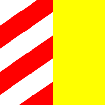
Flag of Trüllikon, Switzerland (fotw)
Horizontal Stripes
The following terms for various types of horizontal
stripes may be encountered when referring to flags, banners of arms, or heraldic
flags of some other description.
- Fess (or Fesse)
- A horizontal band of colour or metal on the field of a flag with its centreline
along the horizontal meridian. The fess is confined to the centre of the field;
however, heraldic use frequently suggests that it should be about one-third of
the width of that field. The term, perhaps unfairly, is not much used in vexillology
(see also ‘bar’,
'stripe', ‘triband’
and ‘tricolour’).
![[Fess]](../images/v/vxt-d379.gif)
- Bar
- A horizontal band of colour or metal on the field of a flag. In heraldry it
is sometimes regarded as a diminutive of fess, however, it is rarely borne singly
and heraldic use frequently suggests that it should be about one-fifth the width
of the field. In vexillology fess and bar are regarded as almost synonymous, with
the difference that a fess is confined to the centreline of the field, whereas
bar is not.
![[bar]](../images/v/vxt-d381.gif)
- Barrulet (barrelet, barruly, barrully, or bracelet)
- A diminutive of bar which is about one quarter the width of the bar or about one-twentieth the
width of the field, and which is never bourn singly – barrelet, barruly, barrully or bracelet. The term is rarely used in vexillology,
where the phrase “a narrow horizontal stripe” is more likely to be seen.
- Barry
- The field divided into four or more horizontal bars. See also a heraldic glossary
or dictionary for various other variations of barry used on the field of a shield
and ‘barry wavy’.
![[pale]](../images/v/vxt-d383.gif)
- Filet
- A diminutive of bar, but of no specified width.
Vertical Stripes
The following terms may be encountered when referring
to a vertical stripe in a flag, or banner of arms, or heraldic flag of some other
description.
- Pale
- A vertical band on the field of a flag with its centreline along the vertical
meridian. The pale is confined to the centre of the field and is about one third
of the width of the field. The term, perhaps unfairly, is not much used in vexillology
(see also 'stripe',
‘triband’
and ‘tricolour’.
![[pale]](../images/v/vxt-d385.gif)
- Pallet (or Palet)
- A vertical band on the field of a flag that is about one quarter of the
width
of the field, whilst an endorse is a vertical band that is about one twelfth or
one sixteenth of the width of the field. These diminutives of 'pale'
are only likely to be encountered in banners of arms.
![[pallet]](../images/v/vxt-d387.gif)
- Paly
- A flag divided into four or more straight vertical bands, and the term vergette
is used by French heralds when there are more than ten bands.
![[paley]](../images/v/vxt-d389.gif)
Introduction | Table of Contents
| Index of Terms | Previous Page | Next Page
Hosted by: Fanshop-Online.de und Handy-Shop.de
Tipp: Apple iPhone XS MAX









![[Fess]](../images/v/vxt-d379.gif)
![[bar]](../images/v/vxt-d381.gif)
![[pale]](../images/v/vxt-d383.gif)
![[pale]](../images/v/vxt-d385.gif)
![[pallet]](../images/v/vxt-d387.gif)
![[paley]](../images/v/vxt-d389.gif)